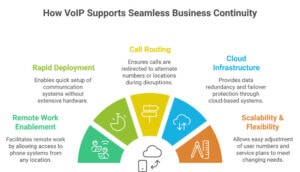In an increasingly interconnected world, businesses face many challenges that can disrupt operations and threaten continuity. Natural disasters, pandemics, cyberattacks, and other unforeseen events can cripple traditional communication systems, leaving organizations scrambling to maintain contact with employees, clients, and stakeholders. This is where Voice over Internet Protocol (VoIP) technology comes into play. VoIP has revolutionized how businesses communicate by converting voice calls into data packets transmitted over the Internet, offering a flexible and cost-effective alternative to traditional phone systems. The importance of business continuity planning cannot be overstated.
Companies must prepare for potential disruptions and implement solutions that ensure seamless communication during crises. VoIP stands out as a critical tool, providing features that enhance resilience and adaptability in adversity. Let us explore seven key ways VoIP ensures business continuity during disruptions, highlighting its benefits for remote work enablement, rapid deployment, call routing capabilities, cloud-based infrastructure, scalability, backup options, and the importance of regular testing and monitoring. By understanding these advantages, businesses can better prepare to navigate challenges while maintaining effective communication.
1. Remote Work Enablement
One of the most significant advantages of VoIP technology is its ability to facilitate remote work. A robust communication system is essential as businesses increasingly embrace flexible work arrangements. VoIP allows employees to access their phone systems from anywhere with an internet connection. This means that employees can continue to work effectively from home or other remote locations during disruptions- whether due to natural disasters or health crises. With VoIP applications available on smartphones and laptops, employees can make and receive calls as if they were in the office. This capability ensures that communication lines remain open and helps maintain productivity when traditional office environments are compromised. Features like video conferencing integrated into many VoIP systems further enhance collaboration among remote teams.
2. Rapid Deployment and Setup
In times of crisis, speed is crucial. Traditional phone systems often require lengthy installation processes and physical infrastructure changes that can delay communication restoration. In contrast, VoIP systems are designed for rapid deployment. Organizations can set up VoIP services quickly without needing extensive hardware installations. For instance, when a natural disaster strikes and an office location becomes inaccessible, businesses can reroute calls to employees working from home or other locations almost instantly. This flexibility allows companies to maintain customer service levels and internal communication without significant downtime. VoIP providers such as Intratel offer user-friendly interfaces that allow administrators to manage settings and features easily, ensuring businesses can adapt their communication strategies.
3. Call Routing Capabilities
VoIP technology excels in call routing capabilities, vital for maintaining communication during disruptions. VoIP systems can automatically redirect incoming calls to alternate numbers or locations when a primary office location is affected by an event such as a power outage or flooding. This feature ensures that no calls go unanswered and that clients and customers can still reach the business. Advanced call routing options include:
- Time-based routing (where calls are directed based on the time of day).
- Geographic routing (where calls are sent to specific locations).
- Skill-based routing (where calls are directed to agents with specific expertise).
These capabilities allow businesses to tailor their communication strategies to their current operational status during disruptions. VoIP systems offer voicemail-to-email features that ensure essential messages are not missed even if employees cannot take calls directly. This level of flexibility is crucial for maintaining customer satisfaction and operational continuity.
4. Cloud-Based Infrastructure
The shift towards cloud-based solutions has transformed how businesses operate and communicate. VoIP systems typically leverage cloud infrastructure, which provides numerous advantages for business continuity during disruptions. Cloud-based VoIP services ensure data redundancy and failover protection—if one server goes down due to a disruption, another server can take over seamlessly. This infrastructure minimizes downtime significantly compared to traditional on-premises phone systems that may require physical repairs or maintenance during outages. Cloud providers often have robust security measures to protect sensitive data from cyber threats—a growing concern for businesses today. Another benefit of cloud-based VoIP systems is accessibility; employees can access their phone systems from any device with internet connectivity. This flexibility means that employees can communicate effectively from different locations without interruption, even if an office is inaccessible due to a disaster or emergency.
5. Scalability and Flexibility
Business needs constantly evolve; therefore, a scalable communication solution is essential for long-term success. VoIP systems offer unparalleled scalability compared to traditional phone lines. Businesses can easily add or remove users as needed without incurring significant costs or delays associated with hardware installation. During disruptions, when workforce needs may change rapidly—such as needing more customer service representatives during a crisis—VoIP allows organizations to adapt quickly by adjusting their service plans accordingly. This flexibility ensures companies can respond effectively to changing circumstances while maintaining operational efficiency. VoIP providers offer tiered service plans with varying features tailored to different business sizes and needs. This allows organizations to choose the level of service that best fits their requirements while ensuring they have room for growth as conditions change.
6. Backup Options for Continuous Communication
To ensure uninterrupted communication during disruptions, having reliable backup options is essential. VoIP systems provide various backup features designed to keep lines of communication open even when primary channels fail. For instance, call forwarding allows businesses to redirect incoming calls to mobile phones or alternate numbers automatically if the main line is down. VoIP solutions offer simultaneous ringing—where multiple devices ring simultaneously—ensuring that calls are answered regardless of where employees are located. Integrating VoIP with other communication tools like email enhances emergency reliability. By creating multiple pathways for communication, businesses can ensure they remain connected with clients and stakeholders even in challenging circumstances.
7. Regular Testing and Monitoring
While implementing a robust VoIP system is crucial for business continuity during disruptions, regular testing and monitoring are equally important for ensuring reliability over time. Proactive management through routine checks helps identify potential issues before they escalate into significant problems. Many VoIP providers offer monitoring tools that track call quality metrics such as latency and jitter—factors affecting voice clarity during calls. By regularly assessing these metrics, businesses can address any technical issues proactively rather than waiting until a disruption occurs. Conducting regular training sessions for employees on using VoIP features effectively ensures everyone is prepared for emergencies. This preparedness fosters confidence among staff members while enhancing overall operational resilience.
Conclusion
In today’s fast-paced business environment, having a reliable communication system is essential for maintaining continuity during disruptions. Voice over Internet Protocol (VoIP) technology offers numerous advantages that help organizations navigate challenges effectively while keeping lines of communication open. VoIP stands out as a critical tool for ensuring business resilience during crises, from enabling remote work and allowing rapid deployment to providing advanced call routing capabilities and leveraging cloud infrastructure for redundancy. Its scalability ensures companies can adapt quickly to changing needs while backup options guarantee uninterrupted communication flow. To thrive in uncertain times, businesses must critically evaluate their current communication strategies and consider integrating VoIP solutions. Doing so will prepare them better for disruptions and future growth opportunities in an ever-evolving landscape.
We at Intratel offer superior VoIP services at the best prices. Call us now! – 1-866-409-8647

